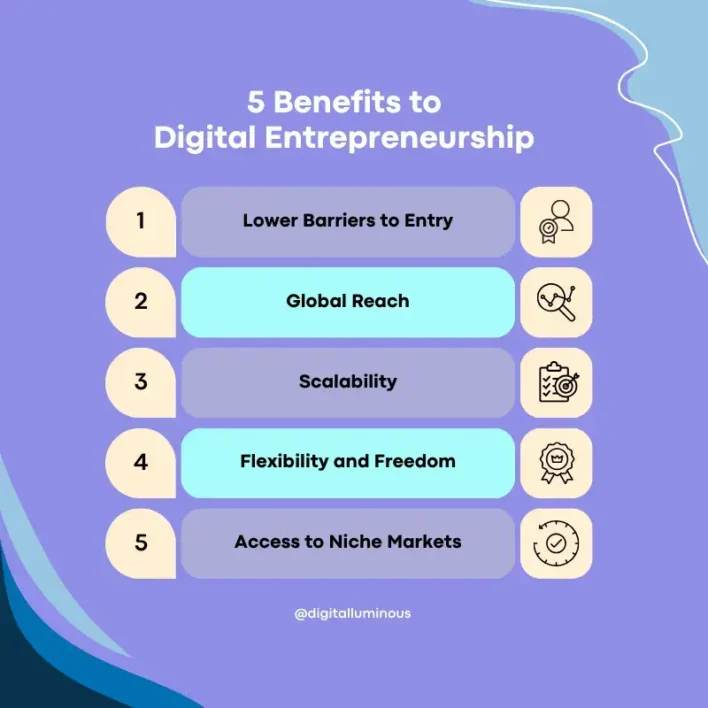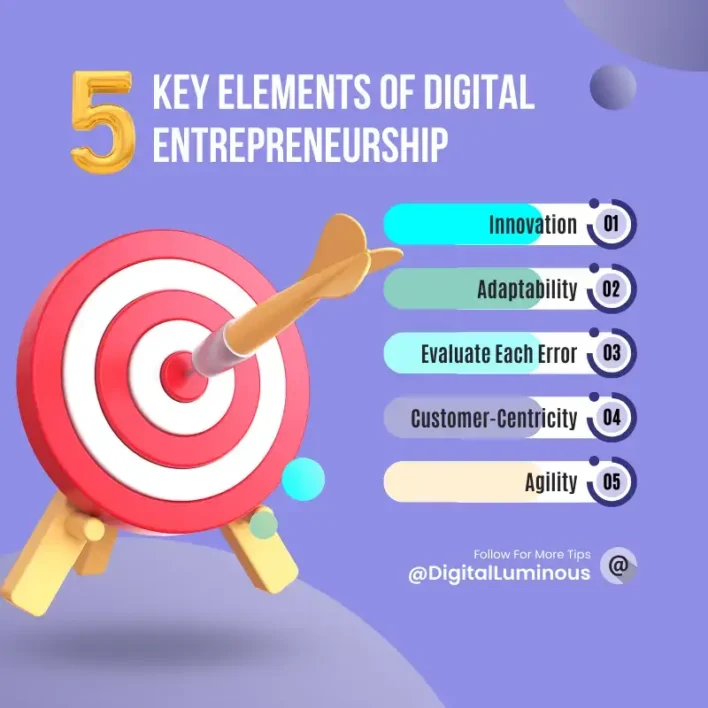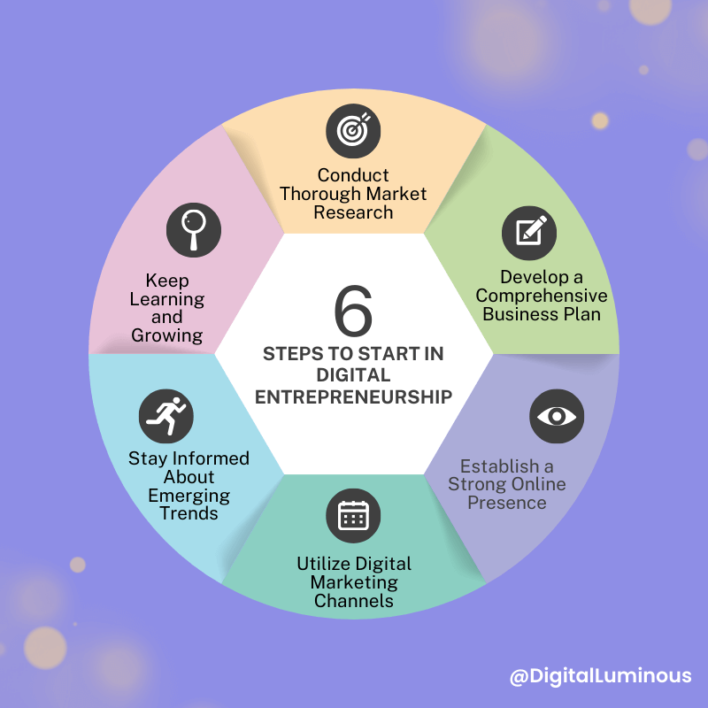
Do you ever wonder how people nowadays seem to be making money effortlessly, just by doing what they love? In the digital age of 2024, entrepreneurship has taken on a whole new dimension.
Gone are the days of traditional brick-and-mortar establishments as the primary avenue for business success. Today, the online world offers a boundless frontier of opportunity for those willing to seize it.
Welcome to the exciting realm of digital entrepreneurship, where innovation, passion, and technology converge to redefine the way we do business.
In this introduction, we’ll delve into the limitless possibilities of the online landscape, exploring how savvy entrepreneurs are leveraging digital platforms to create thriving ventures and shape the future of commerce.
Join us as we embark on a journey to uncover the strategies, trends, and insights driving success in this dynamic and ever-evolving ecosystem.
What is Digital Entrepreneurship?
Digital entrepreneurship isn’t just about starting a business online; it’s about leveraging digital technologies and platforms to innovate and create value in ways that were never before possible.
It’s about embracing the digital landscape to build successful ventures that meet the ever-evolving needs of today’s consumers.
For example, consider a stay-at-home parent who starts a successful e-commerce business selling handmade crafts on Etsy. By utilizing digital platforms like Etsy, they can reach a global audience and turn their passion into a profitable venture without ever leaving home.
Why Digital Entrepreneurship Matters?
In a world where technology is advancing at lightning speed, digital entrepreneurship is driving economic growth, fostering innovation, and creating new opportunities for aspiring entrepreneurs.
By breaking down barriers to entry and offering global reach, scalability, and niche market access, it’s leveling the playing field for anyone with a dream and an internet connection.

- Lower Barriers to Entry: Unlike traditional brick-and-mortar businesses, digital entrepreneurship often requires minimal upfront investment and overhead costs.
With affordable tools and resources available online, virtually anyone with an internet connection can start a digital venture from the comfort of their own home.
- Global Reach: The internet has made the world more interconnected than ever before, allowing digital entrepreneurs to reach a global audience with their products or services.
Whether you’re based in New York City or a small town in the Midwest, the digital landscape offers limitless opportunities to connect with customers from around the world.
- Scalability: Digital businesses have the potential to scale rapidly and efficiently without the constraints of physical infrastructure.
With the right strategy and execution, a digital startup can quickly grow from a small operation to a thriving enterprise, reaching new markets and serving more customers along the way.
- Flexibility and Freedom: One of the greatest perks of digital entrepreneurship is the flexibility it offers.
Whether you’re a freelancer, solopreneur, or small business owner, you have the freedom to set your own schedule, work from anywhere, and pursue projects that align with your passions and interests.
- Access to Niche Markets: The internet has democratized access to niche markets, allowing digital entrepreneurs to target specific audiences with tailored products or services.
Whether you’re catering to fitness enthusiasts, pet lovers, or eco-conscious consumers, there’s a niche market waiting to be tapped into online.
- Innovation and Disruption: Digital entrepreneurship encourages innovation and disruption, challenging traditional business models and driving industry-wide transformation.
From on-demand services to subscription-based models, digital entrepreneurs are constantly pushing the boundaries of what’s possible and reshaping the future of commerce.
For instance, the rise of direct-to-consumer (DTC) brands like Warby Parker and Allbirds. By bypassing traditional retail channels and selling directly to consumers online, these brands can offer high-quality products at lower prices, disrupting established industries and reshaping consumer expectations.
Key Elements of Digital Entrepreneurship

Innovation: Innovation is at the core of digital entrepreneurship, driving progress and differentiation in the market.
Digital entrepreneurs constantly seek to push boundaries and introduce new ideas or technologies that disrupt traditional industries.
- For instance, Tesla revolutionized the automotive industry by developing electric vehicles and pioneering autonomous driving technology.
By challenging conventional norms and embracing innovation, Tesla transformed the way people perceive and interact with cars, setting new standards for sustainability and technological advancement in the automotive sector.
Adaptability: In the fast-paced and ever-changing digital landscape, adaptability is crucial for survival and success. Digital entrepreneurs must be agile and responsive to shifting market dynamics, emerging trends, and unforeseen challenges.
Amid the COVID-19 pandemic, many businesses had to pivot quickly to online sales and remote work to stay afloat.
- For example, restaurants shifted to offering takeout and delivery services, fitness studios transitioned to virtual classes, and traditional retailers accelerated their e-commerce efforts.
By embracing adaptability, these businesses were able to weather the storm and remain relevant in a rapidly evolving environment.
Digital Marketing:
Digital marketing plays a pivotal role in digital entrepreneurship, enabling businesses to reach and engage their target audience effectively.
Leveraging various digital channels and tactics, entrepreneurs can amplify their brand visibility, drive customer acquisition, and foster meaningful connections with consumers.
- Dollar Shave Club is a prime example of a company that leveraged digital marketing to achieve rapid growth. Through witty and engaging digital marketing campaigns, coupled with strategic use of social media influencers, Dollar Shave Club disrupted the shaving industry and attracted a loyal customer base.
By understanding their audience and crafting compelling marketing messages, they were able to scale from a small startup to a multi-million-dollar business.
Customer-Centricity: Placing the customer at the heart of the business is essential for digital entrepreneurs to build trust, loyalty, and long-term relationships.
By understanding customer needs, preferences, and pain points, entrepreneurs can deliver tailored solutions and exceptional experiences that resonate with their target audience.
- Amazon exemplifies the importance of customer-centricity in digital entrepreneurship. With a relentless focus on customer satisfaction and convenience, Amazon has become the e-commerce giant it is today, earning the trust and loyalty of millions of customers worldwide.
By prioritizing customer experience and continually innovating to meet evolving demands, Amazon has set the standard for excellence in customer-centric business practices.
Agility: Agility is a hallmark of successful digital entrepreneurship, enabling entrepreneurs to respond swiftly to changing market conditions and capitalize on emerging opportunities.
Digital entrepreneurs must be nimble, adaptable, and willing to pivot their strategies when necessary.
- Netflix exemplifies agility in digital entrepreneurship with its evolution from a DVD rental service to a streaming video platform. Recognizing the shift in consumer preferences towards online streaming, Netflix embraced agility and pivoted its business model accordingly.
By leveraging technology and content licensing agreements, Netflix transformed itself into a global powerhouse in the entertainment industry, catering to the changing needs and preferences of its audience.
Getting Started in Digital Entrepreneurship

Conduct Thorough Market Research: Before diving into digital entrepreneurship, it’s essential to conduct comprehensive market research to identify opportunities and validate your business ideas.
- For instance, if you’re considering starting an e-commerce business selling eco-friendly home products, you might use tools like Google Trends to analyze search trends related to sustainable living.
Additionally, conducting surveys among your target audience can provide valuable insights into their preferences, pain points, and purchasing behavior.
By gathering and analyzing data effectively, you can ensure that there’s demand for your products or services before investing time and resources into launching your venture.
Develop a Comprehensive Business Plan: A well-thought-out business plan is essential for guiding your digital entrepreneurship journey and setting a clear roadmap for success.
- For example, if you’re planning to launch a subscription-based meal delivery service targeting health-conscious consumers, your business plan might outline your goals, target market segments (e.g., busy professionals, fitness enthusiasts), unique value proposition (e.g., chef-curated meals using locally-sourced ingredients), and monetization strategy (e.g., monthly subscription fees).
By defining key elements of your business upfront, you can lay a solid foundation for growth and profitability.
Establish a Strong Online Presence: Building a strong online presence is crucial for attracting and engaging customers in the digital landscape.
- Suppose you’re launching a freelance graphic design business targeting small businesses and startups. In that case, you might start by developing a professional website showcasing your portfolio, services, and client testimonials.
Additionally, investing in branding elements such as a logo, color scheme, and brand messaging can help differentiate your business and create a memorable impression on potential clients.
By creating valuable content relevant to your target audience and sharing it on social media platforms like Instagram and LinkedIn, you can further establish credibility and attract potential clients.
Utilize Digital Marketing Channels: Digital marketing channels offer powerful tools for reaching and connecting with your target customers effectively.
- Suppose you’re launching a subscription-based meditation app aimed at reducing stress and promoting mindfulness. In that case, you might leverage Facebook ads targeting users interested in wellness and self-improvement.
Additionally, running Google AdWords campaigns targeting relevant keywords such as “meditation app” or “stress relief” can help drive traffic to your app’s landing page and attract potential subscribers.
Collaborating with influencers in the wellness space to promote your app to their followers can also help expand your reach and generate user interest.
Stay Informed About Emerging Trends and Technologies: In the rapidly evolving digital landscape, staying informed about emerging trends and technologies is essential for staying ahead of the curve and seizing new opportunities.
- For example, if you’re running a digital marketing agency specializing in social media management, you might follow industry blogs like Social Media Examiner and attend webinars hosted by leading experts in the field.
Joining online communities such as Facebook groups or LinkedIn forums dedicated to digital marketing can also provide valuable networking opportunities and insights into the latest trends and best practices.
By staying informed and continuously learning, you can adapt your strategies to meet evolving market demands and maintain a competitive edge in the digital entrepreneurship space.
Conclusion
Digital entrepreneurship offers endless possibilities for those willing to embrace it.
By leveraging digital technologies and platforms, entrepreneurs can turn their ideas into reality, reach global audiences, and build thriving businesses in the online world.
So, are you ready to seize the opportunities of digital entrepreneurship and embark on your entrepreneurial journey?
FAQs
What is digital entrepreneurship?
Digital entrepreneurship involves creating and managing businesses that operate primarily in the digital realm, leveraging technology and online platforms to innovate, reach customers, and drive growth.
How can digital entrepreneurship benefit me as a small business owner?
Digital entrepreneurship offers lower barriers to entry, global reach, scalability, and the ability to tap into niche markets, enabling small businesses to compete and thrive in the digital age.
What are some examples of successful digital entrepreneurs in the USA?
Successful digital entrepreneurs in the USA include Jeff Bezos of Amazon, Elon Musk of Tesla, and Mark Zuckerberg of Facebook, who have transformed industries and revolutionized the way we do business online.
Do I need technical skills to start a digital business?
While technical skills can be beneficial, they’re not always necessary. Many successful digital entrepreneurs focus on their strengths and leverage technology and expertise from others to fill any skill gaps.
How do I come up with a viable business idea for online entrepreneurship?
Start by identifying problems or needs in the market and think about how digital technology can provide solutions. Conduct market research, analyze trends, and validate your ideas before moving forward.
What are the main challenges of starting a digital business in the USA?
Challenges may include intense competition, staying updated on technology trends, navigating regulatory and legal issues, and maintaining a work-life balance in the digital world.
What are some common misconceptions about digital entrepreneurship?
One misconception is that digital entrepreneurship is easy or requires minimal effort. In reality, it requires dedication, hard work, and continuous learning to succeed in the competitive online landscape.
How can I finance my digital business venture in the USA?
Financing options may include bootstrapping, seeking funding from investors or lenders, crowdfunding, or applying for small business loans or grants offered by government agencies or financial institutions.
What are the essential steps to launching a successful online business?
Essential steps include conducting market research, developing a business plan, building an online presence, utilizing digital marketing channels, and staying informed about industry trends and technologies.
How do I build a strong online presence for my digital business?
Focus on website development, branding, and content creation, optimize your website for search engines, engage with your audience on social media, and leverage digital marketing strategies to reach and connect with your target customers effectively.
What are some effective digital marketing strategies for online entrepreneurs?
Effective digital marketing strategies may include content marketing, email marketing, search engine optimization (SEO), social media marketing, influencer partnerships, and paid advertising on platforms like Google and Facebook.
How do I stay updated on emerging trends and technologies in digital entrepreneurship?
Stay informed by following industry blogs, attending webinars and conferences, joining online communities and forums, networking with other entrepreneurs, and continuously learning and experimenting with new ideas and strategies.
How long does it take to see success with a digital business in the USA?
The timeline for success varies depending on various factors such as the nature of the business, market conditions, competition, and execution strategies. Some digital businesses may see rapid growth, while others may take longer to establish themselves and see significant returns on investment.
What are some common mistakes to avoid when starting a digital business?
Common mistakes include neglecting market research, underestimating competition, overspending on marketing without a clear strategy, and failing to adapt to changing market conditions and consumer preferences.
How important is customer feedback in digital entrepreneurship?
Customer feedback is crucial for improving products or services, enhancing customer experience, and driving business growth. Actively seek feedback from customers, listen to their needs and preferences, and use insights to make informed decisions.
What are some signs that my digital business is gaining traction?
Signs of traction may include increasing website traffic, growing social media followers, higher engagement and conversion rates, positive customer reviews and testimonials, and expanding sales and revenue.
How can I differentiate my digital business from competitors?
Differentiate your business by offering unique value propositions, delivering exceptional customer service, focusing on niche markets, providing personalized experiences, and continuously innovating and adapting to meet evolving customer needs.
What role does branding play in digital entrepreneurship?
Branding is essential for establishing your digital business’s identity, building trust and credibility with customers, and creating emotional connections that drive loyalty and advocacy. Invest in branding elements such as logos, colors, messaging, and storytelling that resonate with your target audience.
How do I scale my digital business as it grows?
Scaling requires strategic planning, investment in infrastructure and resources, delegation of tasks, automation of processes, and continuous optimization of operations. Focus on sustainable growth strategies that align with your business goals and customer needs.
What are some resources for aspiring digital entrepreneurs in the USA?
Resources include online courses and workshops, mentorship programs, business incubators and accelerators, industry associations and networks, government agencies and support services, and books and podcasts featuring insights from successful entrepreneurs.


